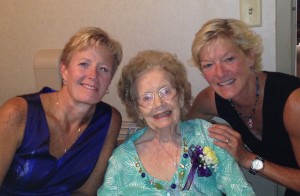
Birthday Sunday!
One of our senior saints, Jackie Abernethy, celebrates her 94th birthday tomorrow with family. All Caldwellians are invited to drop by to see her at Sardis Oaks Sunday after the potluck. Look for a card you can sign for her at church on Sunday.
Dear Caldwell,
As we travel from Sunday to Sunday this week, we live in tension – the tension that comes with knowing our sovereign God is with us, yet seeing the world so broken (witnessed just this week in the tragedy in Roanoke).
As I said in my sermon last Sunday, living in tension can convey to us the energy we need to advance the kingdom of God on earth as it is in heaven. The more I study scripture, the more I am convinced that to be people of faith is to live in that tension, which requires us to lean on God for perseverance and call on God for strength to do God’s work as God’s distinctive people, not a social service agency or some other non-profit.
That tension comes up again in the lectionary passages for this Sunday. Each poses questions of how we, as people of faith, are to be people of identity and integrity in the service of God, how we balance the urgency of the call to justice with the constancy of love and gentleness that is needed to hold us together, working humbly in God’s sight.
(Several people asked for my words on a few ideas about living in that tension last Sunday, so the sermon is excerpted below.)
Don’t forget there is a potluck meal on Sunday after church. It’s a great chance to catch up with each other – young and old – now that summer is past. We will also hear about the work our youth are doing and have planned as they bear witness in the world. I’m looking forward to it.
In Christ,
John
Sermon Excerpt on John 6:56-69
Sometimes the gospel is offensive. That is the way the gospel sometimes works, isn’t it? It offends us. It offends others. It’s declaration that God came into the world in flesh and blood that was also life and spirit doesn’t fit the confines of our finite minds. Its portrayal of the kingdom of God on earth offends earthly powers and principalities that would otherwise like to define the world in their own image.
Its promise, as in the Beatitudes, that the last will be first and the first last, doesn’t square with our self-justifying ways. It reminds us that we are not really in control and that is indeed a “difficult teaching.”
To be sure, in Jesus Christ, God loved the world by sometimes offending it.
* * *
That is why some turned back. That day with Jesus, John says, some quit.
Turning back is easier than bearing witness to a gospel that offends the world. Giving up us easier than sticking it out.
In our relationships, it’s far easier to be offended at the other person’s behaviors and beliefs than to look objectively at our own, that is, as much as any of us can be objective about ourselves.
Jesus must have gotten used to people dropping out on him. Sure there were crowds of 5,000 when the loaves and fishes were being handed out. Sure, people flocked to see a good miracle, like raising a dead man or healing another man’s blindness with some mud. People always came when Jesus preached a good sermon. But, in the end, Jesus’ true followers were so few they all fit in one room, where they hid on the night of his crucifixion. In fact, today’s passage the first time John refers to Jesus’ most loyal followers as “the twelve.”
As I said last week about the armor of God, Jesus’ promise of only life and spirit may not sound like much on the mean streets of the 21st century.
Thanks be to God that our streets did not turn mean Friday night after the judge in the trial of office Randall Kerrick announced a mistrial. After of months of waiting across our city, it was a non-answer answer. It’s unsatisfying and it leaves the matter still open. And the fact that there haven’t been great protests doesn’t mean there isn’t deep anger and frustration.
So now we live in that tension. We have neither a guilty nor a non-guilty verdict. I wonder if living in that tension isn’t exactly where we need to be. Yes, the Attorney General will decide whether to retry the case. In the meantime, the ultimate and broader question of justice in our city lies in our hands. That is where it should be.
During the trial, one of my clergy colleagues asked the mother of Jonathan Ferrell how she was holding up. She has been a symbol of unwavering peace and strength.
Mrs. Ferrell replied, “It hasn’t felt good but it is for the good.”
A question for all of us is: How do we live in the tension of this moment constructively? How can we deliver on the hope behind Mrs. Ferrell’s statement? How do we make this tragedy – a tragedy for both the Kerrick and the Ferrell families – something that is indeed for the good?
How can we build a community that is more just, more fair and, at the same time, a city of peace, mutual respect and equitable interdependence.
As we remember how some of Jesus’ followers turned back on him when things got difficult, the question for us is: will we turn back?
This is no time to turn back for there is work to do.
Those of us who do a lot of the talking need to quiet down and listen deeply. We need to hear the pain and fear and hopelessness of some of our neighbors and work in and through the systems that control resources and opportunity.
Those of us with power and privilege need to take stock of our advantages. We need to empower others, not through the evils of polite patriarchy or colonialism, not through charity but through systemic change that truly levels the playing field. We need to do all these things through honest, authentic and sustained relationships, here at Caldwell and across our city.
Can we live in that tension, keeping the energy and urgency of these days in a way that is constructive?
What will we say to all of this? Will we say, as the disciples did that day with Jesus, “This is a difficult teaching: who can accept it?” Will we turn back?
There is no turning back, friends, for Jesus beckons us forward. Indeed, in many ways, this moment can be a new beginning. It can be a time when black and white come together to speak the truth in love. It can be a time when we cannot afford to be easily offended.
It can be a day when we stick with each other and take a hard look at statutes such as the “stand your ground” statute and the police force’s freedom by policy to “shoot to kill” when there are other ways to defuse potentially tragic circumstances.
At this moment in our city, to turn back from these conversations and convictions is to say that black lives don’t matter. To stick together, is to follow Jesus and tell who would listen that black lives do matter.
And indeed, because black lives matter, we need to take a complete look at what happens in our city. At a recent July Saturday meeting of the Charlotte Presbytery, we had a focused dialogue on race. One African-American friend at my table was still visibly upset by the tragedy in Charleston.
But he was also upset by what he sees in his own neighborhood all too often. Our work isn’t complete, he said, until we take a hard look at all of the shootings and homicides in our city. He cited the hundreds of black-on-black crimes and shootings Charlotte experiences. There were three just last night. What must we do to provide more hope and opportunity in those neighborhoods so there are ways to make a living that do not involve violence and risk of life on a daily basis? ….
